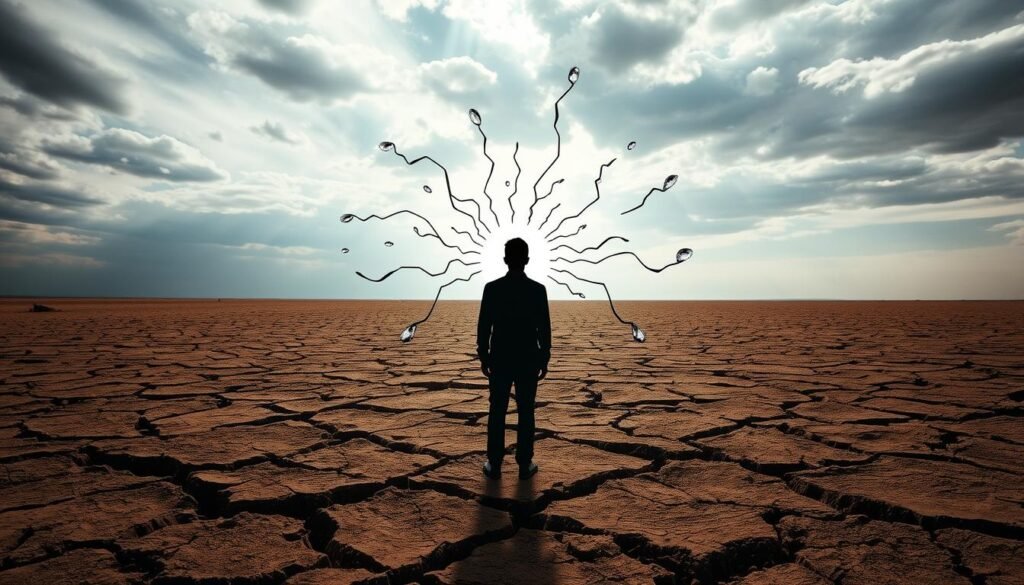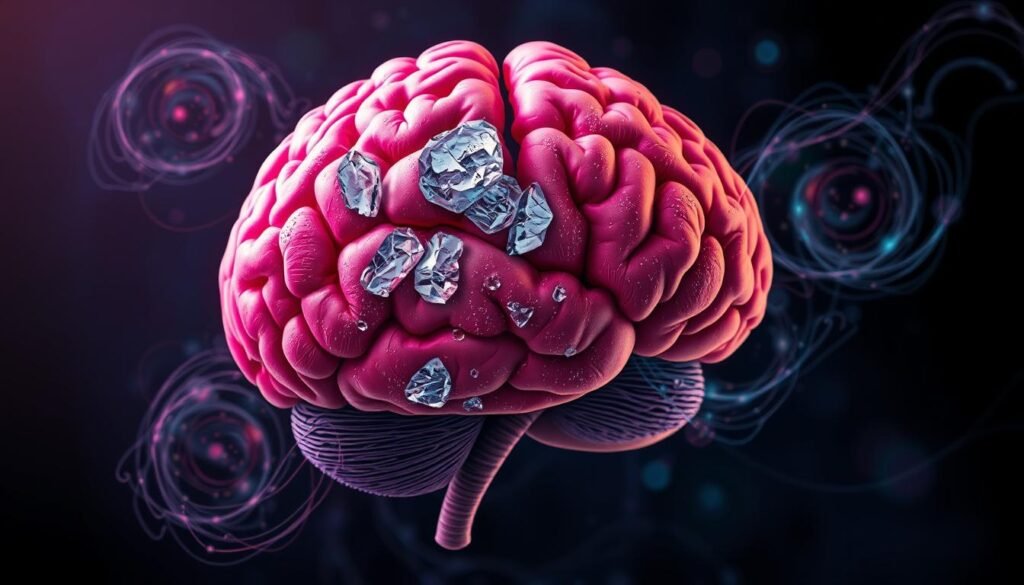Did you know a shocking 75% of Americans don’t drink enough water? This fact shows how big the problem of not drinking enough water is. It affects us in more ways than just being thirsty. Scientists are finding links between how much water we drink and how we feel mentally. Not having enough water can lead to tiredness and headaches. But it might also make people feel anxious. To keep your mind healthy and stress low, it’s important to drink enough water. If you’re interested in how not drinking enough water can affect your mind, check out this helpful article.
Key Takeaways
- A large portion of the population, around 75%, is unaware they are dehydrated.
- Dehydration can cause various symptoms, including headaches and fatigue.
- Chronic dehydration may contribute to feelings of anxiety.
- Recognizing signs of dehydration is key for emotional well-being.
- Maintaining adequate hydration is essential for mental health.
Understanding Dehydration and Its Prevalence
Dehydration happens when you lose more fluids than you drink. This leads to not having enough water and key electrolytes. All ages can get dehydrated, but it hits older people harder. About 28% of folks over 60 are dehydrated. And a shocking 75% of American adults are not drinking enough water.
A tiny loss of fluids, just 2%, can mess with your mind. It affects memory, mood, focus, and how fast you react. Water keeps our blood and heart working right. It also keeps our joints healthy. Not drinking enough can cause headaches because the brain pulls away from the skull.
To stay healthy, we need to drink more water. Even just 1% more water can mean eating fewer calories and less junk food. It even helps with our body shape. A good rule is to drink a third of your body weight in ounces of water daily. At least, aim for eight glasses of 8 ounces each day. Spotting dehydration early means you can do something about it sooner.
How Dehydration Affects Mental Health
Dehydration has a big impact on mental health. Even a little dehydration can change your mood, energy, and how well you think. Studies have shown that people who don’t drink enough water feel more anxious and tense. A study with 188 men found those who were dehydrated were much more anxious than those who drank enough water.
Research proves that not drinking enough water leads to more anxiety. This happens because dehydration changes the body’s normal functions and lowers heart rate variability. This is why feeling anxious and not drinking enough water are linked.
The brain is about 75% water, showing how vital water is for our minds and feelings. Dehydration can make you confused, tired, moody, and easily annoyed. It’s very important to drink enough water for your mental wellness. Not doing so can have bad effects on your health.
| Dehydration Level | Body Water Loss | Possible Symptoms | Mental Health Impact |
|---|---|---|---|
| Mild | 1-2% | Fatigue, difficulty concentrating | Increased anxiety, irritability |
| Moderate | 3-5% | Confusion, memory recall issues | Heightened tension and stress |
| Severe | 6% or more | Fainting, severe confusion | Potentially life-threatening symptoms |
Staying hydrated is key to feeling emotionally well. Knowing how water affects your mind is important. By drinking the right amount of water, you can lower anxiety and boost your mood.
Symptoms of Dehydration You Should Not Ignore
Spotting dehydration symptoms early is key to staying healthy in body and mind. Look out for common signs of dehydration like:
- Thirst
- Dry mouth
- Dark yellow urine
- Fatigue
- Headache
- Dizziness
Babies and kids might show signs of dehydration differently, such as being unusually irritable, having dry diapers, or feeling very tired. Not paying attention to these symptoms can lead to serious issues. This includes more anxiety and long-term health problems. It’s very important to watch for dehydration in kids and older people.
You might also notice being slower to react or feeling confused when trying to do things. If you don’t drink enough water, your brain can’t work as well. This might make you cranky. Keeping up with your water intake is vital for your mental health. It helps with your mood and concentration.
About 60% of our bodies are water, so drinking at least two liters every day is critical. This includes water and moisture from foods like fruits and veggies. For more information on how not drinking enough water can affect you, especially your mental health, visit dehydration and anxiety.
The Link Between Dehydration and Anxiety
Many people don’t see how deep the link between dehydration and anxiety goes. Our bodies are about 60% water, which shows how vital water is for our well-being. Not drinking enough water hurts both our body and mind.
A lot of people don’t drink enough water daily. This can make anxiety worse and bring on panic attack symptoms like a fast heartbeat and feeling dizzy. Not having enough water also makes it hard for the body to make serotonin, a key brain chemical for feeling happy.
Drinking enough water helps control anxiety. When you’re well-hydrated, you’re less likely to feel anxious. This helps stop the vicious cycle where anxiety makes you forget to drink water.

By staying hydrated, we might lessen some anxiety symptoms. Adults should aim to drink at least two liters of water a day, which can also come from food and other drinks. Taking care of our hydration can lead to a healthier mind and body.
Can Dehydration Cause Anxiety? Exploring Research Findings
The link between staying hydrated and mental health is getting more attention. Many studies on dehydration and mental health show not drinking enough water can cause problems like anxiety. Learning about dehydration’s effect on mood and thinking helps us see if it really can lead to anxiety.
Studies Supporting the Connection
Studies have found that just a 1.5% loss of body water can negatively affect mood and how we think. Research from the University of Connecticut found people felt more anxious when they didn’t drink enough water. Another study showed folks felt more anxious until they drank water again. These facts highlight how important drinking water is for our mental well-being. For deeper insights, visit this resource.
Effects of Low Water Intake on Mood
Not drinking enough water can lead to physical signs like headaches and tiredness. These can make anxiety worse in some people. Studies show that 30-50% of those with anxiety also have symptoms of not drinking enough water. Even our brain chemicals, like serotonin and dopamine, might get out of balance with low water intake. This affects about 40% of folks with anxiety. This shows us how key drinking water is, not just for our body, but for a happy mind too.
The Impact of Dehydration on Cognitive Function
Research increasingly shows that staying hydrated is key to how well we think and feel. Even small drops in water levels in our body can make it hard for us to focus and stay mentally sharp. It’s very important to drink enough water to keep our minds working well.
Mental Performance and Concentration
A lot of studies have found that not drinking enough water can make it hard to concentrate and perform well mentally. A big review of 33 studies with 413 people found that losing more than 2% of body water leads to a clear drop in thinking abilities. For older adults, especially women, being even a little dehydrated can slow down how fast they can think and pay attention.
The brain is about 73% water, so it needs plenty of water to work best. This is why it’s so important to understand how not drinking enough water affects our minds, especially for older people.
How Dehydration Induces Emotional Changes
Not drinking enough water can also make people feel more irritable, confused, and anxious. These feelings can make it even harder to think clearly and concentrate. Hydration is important not just for how we think, but also for how we feel. Drinking enough water is key for both our mental and emotional health.

| Body Water Percentage | Cognitive Performance Decline | Emotional Effects |
|---|---|---|
| 1-2% Loss | Basic functions impaired | Mood changes, increased irritability |
| 2% Loss or More | Significant impairment in attention | Higher risk of anxiety and confusion |
| Over Age 65 | Higher risk for cognitive decline | Worsened emotional stability |
More research on how not drinking enough affects our mind and the importance of drinking water is being done. This knowledge is especially important for older adults. It helps us promote better health habits focused on staying hydrated for both our brains and overall well-being.
Managing Dehydration-Induced Anxiety
Dealing with dehydration-induced anxiety means finding the right hydration strategies for each person. Since about 75% of Americans don’t drink enough, it’s key to focus on getting enough fluids. It’s advised for men to drink about 15.5 cups (3.7 liters) and women should aim for 11.5 cups (2.7 liters) daily. This includes fluids from both drinks and food.
Adding drinks full of electrolytes is a good move, especially after working out or when sick. These help with dehydration management by replacing lost fluids and improving well-being. Knowing how much water you need and watching your intake can help ease anxiety through hydration. It’s especially important for people prone to anxiety. Research shows not drinking enough water can make anxiety worse.
Understanding how things like exercise, heat, and health affect how much water you need is crucial. Experts say not drinking enough can make you feel tense, confused, and angry. Taking steps to drink more water can help ease anxiety and make you feel better overall.
Importance of Staying Hydrated
Staying hydrated is key to good health. It does more than stop your thirst. It affects your mind and body a lot. Dehydration can make you feel tired, give you a headache, and make you dizzy. It can also mess with your mind, causing confusion and more anxiety.
Drinking enough water has many benefits. It helps your brain work better and keeps your mood steady. A study in 2018 found that people who drank a lot of water had less chance of feeling anxious or depressed. And, those who didn’t drink enough felt more anxious. This shows how important water is for your mental health.

Hydration is especially important when it’s hot out. Always carry a water bottle with you. Keeping your electrolytes balanced is also crucial, as not having enough can drain important minerals like potassium and sodium. These minerals are needed for your body to work right. Drinking fluids with electrolytes helps avoid dehydration problems.
Getting into good hydration habits can really improve your life. It boosts your mental and physical health. Drinking enough water is a must for staying healthy every day. If you’re interested in other ways to support your brain and mental health, check out this helpful resource.
| Hydration Effects | Mental Health Impact |
|---|---|
| Fatigue | Increased confusion |
| Dizziness | Higher anxiety levels |
| Muscle cramps | Reduced mood regulation |
| Depletion of electrolytes | Potential for depression |
Hydration Recommendations for Different Populations
Hydration needs change a lot among different people. This makes it very important to have specific hydration recommendations. Certain groups have special hydration challenges. Addressing these can greatly improve their health and mental well-being.
Older adults may not feel as thirsty, which can lead to not drinking enough water. It’s very important to encourage them to drink regularly to avoid dehydration. For young children, they’re very active and might not notice when they’re thirsty. They need to be reminded to drink water more often.
Generally, men should drink about 3.7 liters and women about 2.7 liters of fluids a day. But, how much water a person needs can change based on things like their age, health, and how active they are. Below is a table with hydration recommendations for different types of people:
| Population | Daily Fluid Intake Recommendation | Special Considerations |
|---|---|---|
| Adults | 3.7 liters (men); 2.7 liters (women) | Adjust based on activity level |
| Older Adults | Varies; emphasize regular fluid intake | Diminished thirst sensation |
| Children | Varies by age and size; frequent reminders advised | Higher activity levels increase needs |
| Athletes | May exceed 3.7 liters, especially in hot environments | Consider additional electrolytes |
| Individuals with Chronic Conditions | Personalized based on health status | Consult healthcare provider for guidance |
Thinking about hydration for specific groups helps improve health outcomes. Carrying a water bottle and eating fruits and veggies that are full of water help a lot. Knowing how much water you need is very important for staying hydrated and healthy.
Conclusion
Knowing how hydration and anxiety connect is key for mental health. Not drinking enough water can cause both physical issues and emotional upsets. A study with 3,327 Iranian adults showed those drinking less than 2 glasses a day were twice as likely to feel anxious than those drinking 5 or more glasses. This shows how important water is for emotional health.
Even being slightly dehydrated, like losing just 1% of body water, can make you feel bad. It can impact your mood and make anxiety worse. Feeling irritable, dizzy, or tired can seem like anxiety, making it hard to tell them apart. That’s why staying hydrated is crucial for managing mental health.
To keep your mind healthy, drink about eight 8-ounce glasses of water every day. Staying hydrated boosts brain function, improves mood, and lowers the chance of feeling anxious because you’re dehydrated. To learn more, you can check out the study here.